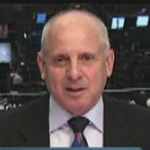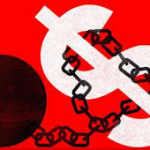
Blog
 04/25/2023 - Dr. Albert Friedberg Quarterly Update
04/25/2023 - Dr. Albert Friedberg Quarterly Update

 04/25/2023 - The Roundtable Insight – David Rosenberg and Yra Harris on the Economy and the Financial Markets
04/25/2023 - The Roundtable Insight – David Rosenberg and Yra Harris on the Economy and the Financial Markets

 04/25/2023 - Yra Harris: Why Ueda Needs To Raise Rates Or Expand Yield Curve Control
04/25/2023 - Yra Harris: Why Ueda Needs To Raise Rates Or Expand Yield Curve Control

“The world’s central banks OUGHT to suggest to Ueda to raise its YCC ceiling BECAUSE THE WEAK YEN FROM THE CARRY TRADE IS CAUSING GRAVE DANGER FOR THE GLOBAL FINANCIAL SYTEM. The ongoing carry trade elevates global assets — stocks and bonds — suggesting that financial conditions are still to loose. In a previous blog post I suggested that the FED and ECB should not use the equity prices as the BAROMETER of financial conditions but look at other metrics like consumer debt and certainly the rollover of commercial real estate loans.”
 04/24/2023 - Daniel Lacalle – GOLD IS MONEY. FIAT Is Credit
04/24/2023 - Daniel Lacalle – GOLD IS MONEY. FIAT Is Credit

 04/24/2023 - Zoltan Pozsar Says Commodities Are Poised for Growth
04/24/2023 - Zoltan Pozsar Says Commodities Are Poised for Growth

Link to Another Related Article
 03/29/2023 - The Roundtable Insight – Chen Zhao and Yra Harris on the Global Economy, Geopolitical Risks and the Financial Markets
03/29/2023 - The Roundtable Insight – Chen Zhao and Yra Harris on the Global Economy, Geopolitical Risks and the Financial Markets

 03/23/2023 - Article: Here’s Why Another Banking Crisis is Unlikely… We’ll Get Inflation Instead
03/23/2023 - Article: Here’s Why Another Banking Crisis is Unlikely… We’ll Get Inflation Instead

“If the central banks opt to keep the system afloat – bad debts, losses and all – what we inevitably get is inflation and a gradual collapse of the currency.”
 03/21/2023 - Yra Harris – How Many `Whatever It Takes’ …
03/21/2023 - Yra Harris – How Many `Whatever It Takes’ …

“STOP DEPENDING ON EQUITY MARKETS AS THE TELL IN FINANCIAL CONDITIONS it is a methodology promoted by the purveyors of asset peddling. PAUSE AND TAKE A MEASURE OF THE FINANCIAL UNCERTAINTY INFECTING THE GLOBAL FINANCIAL SYSTEM. The political backlash you will be facing from those warning about how workers will pay the price in unemployment while the RENTIERS GET BAILED OUT. It is FIRST REPUBLIC ON THE BOIL NOW BUT WITH LESS LENDING AND HIGHER RATES ON THE HORIZON THE COMMERCIAL REAL ESTATE LENDERS WILL BE NEXT. IS 25 BASIS POINTS WORTH IT? Where is your cost-benefit analysis?”
 03/21/2023 - George Gammon – Biggest Rate Decision in History
03/21/2023 - George Gammon – Biggest Rate Decision in History

 03/06/2023 - Legendary Global Strategist Chris Wood
03/06/2023 - Legendary Global Strategist Chris Wood

 03/01/2023 - The Roundtable Insight – Tavi Costa on the Global Economy and the Financial Markets
03/01/2023 - The Roundtable Insight – Tavi Costa on the Global Economy and the Financial Markets

 02/27/2023 - Russell Napier on Financial Repression
02/27/2023 - Russell Napier on Financial Repression

 02/23/2023 - The Roundtable Insight – Jayant Bhandari and Yra Harris on China and Japan Equities, USD and Geopolitical Risks
02/23/2023 - The Roundtable Insight – Jayant Bhandari and Yra Harris on China and Japan Equities, USD and Geopolitical Risks

 02/23/2023 - The Roundtable Insight – Success and Freedom – in Spanish
02/23/2023 - The Roundtable Insight – Success and Freedom – in Spanish
 02/22/2023 - The Roundtable Insight – Spain and Argentina
02/22/2023 - The Roundtable Insight – Spain and Argentina

 02/14/2023 - The Roundtable Insight – Joseph Wang and Yra Harris on the Fed, Interest Rates, Inflation and the USD
02/14/2023 - The Roundtable Insight – Joseph Wang and Yra Harris on the Fed, Interest Rates, Inflation and the USD

 02/05/2023 - Former Glencore CEO on ESG and Sustainability
02/05/2023 - Former Glencore CEO on ESG and Sustainability

 02/02/2023 - The Roundtable Insight – Peter Boockvar and Yra Harris on Central Bank Policies, Equities and Commodities
02/02/2023 - The Roundtable Insight – Peter Boockvar and Yra Harris on Central Bank Policies, Equities and Commodities

 01/31/2023 - Daniel Lacalle – Gold Soars and Precious Metals Rise on Money Destruction
01/31/2023 - Daniel Lacalle – Gold Soars and Precious Metals Rise on Money Destruction

 01/27/2023 - The Roundtable Insight – Judd Hirschberg Analyzes the Financial Markets
01/27/2023 - The Roundtable Insight – Judd Hirschberg Analyzes the Financial Markets







